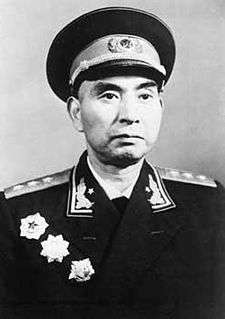Yang Yong (general)
| Yang Yong | |
|---|---|
| 杨勇 | |
 Yang Yong | |
| Secretary of Secretariat of the Communist Party of China Central Committee | |
|
In office September 1982 – January 1983 | |
| Deputy Secretary General of Central Military Commission. | |
|
In office January 1980 – January 1983 | |
| Deputy Chief of staff of People's Liberation Army General Staff Department | |
|
In office September 1977 – January 1980 | |
| Governor of Guizhou | |
|
In office January 1950 – April 1951 | |
| Personal details | |
| Born |
October 28, 1913 Liuyang, Hunan |
| Died |
January 6, 1983 (aged 69) Beijing |
| Political party | Communist Party of China |
| Children | Yang Xiaoping (杨小平)[1] |
| Alma mater | PLA National Defence University |
| Occupation | Politician |
| Awards |
Order of Bayi Order of Independence and Freedom Order of Liberation |
| Military service | |
| Allegiance |
|
| Service/branch |
|
| Years of service | 1927-1983 |
| Rank |
|
| Commands | Commanding officer |
| Battles/wars |
Second Sino-Japanese War Chinese Civil War |
| Yang Yong | |||||||
| Traditional Chinese | 楊勇 | ||||||
|---|---|---|---|---|---|---|---|
| Simplified Chinese | 杨勇 | ||||||
| |||||||
Yang Yong (28 October 1913 – 6 January 1983) was a general in the People's Liberation Army of China.[2] He served as the secretary of the Secretariat of the Communist Party of China Central Committee between September 1982 and January 1983, and governor of Guizhou, from January 1950 to April 1951.[1]
Life
Yang Yong was born Yang Shijun (Chinese: 杨世峻/楊世峻) in Wenjiashi Town of Liuyang, Hunan province, Republic of China.
In 1926, Yang joined the Young Pioneers of China and served as the captain. In April 1927, he joined the Communist Youth League of China. After the Mari Incident (Chinese: 馬日事變/马日事变), he took part in the Long March.
In February 1930, Yang joined the Communist Party of China and Chinese Workers' and Peasants' Red Army, at that time, he took part in the Fifth Encirclement Campaign against Jiangxi Soviet.
During the Second Sino-Japanese War, he wounded in the Battle of Pingxingguan.
In May 1940, Yang served as the commanding officer of the West of Shandong Military Region.
In 1945, Yang took part in the Handan Campaign, then Longhai Campaign, Dingtao Campaign, and Huai County Campaign.
In July 1947, Yang took part in the West of Henan Campaign, Yuncheng Campaign. One year later, he took part in the Huaihai Campaign. After 1949, he commanded the 5th Army (including the 17th and 18th Corps) of the Second Field Army.
After the founding of PRC, Yang served as the governor of Guizhou and commanding officer of Guizhou Military Region.
At the end of 1950, Yang entered the PLA National Defence University and served as the director.
In April 1953, Yang went to North Korea to assist in the Korean War.
On September 27, 1955 he was made a full general of PLA.
In October 1958, he was appointed as commanding officer of Beijing Military Region.
In 1966, Mao Zedong launched the Cultural Revolution, he suffered political persecution and experienced mistreatment; he was rehabilitated in 1978.[3]
In 1972, he served as the deputy commanding officer of Shenyang Military Region, then he was transferred to Xinjiang.
In August 1973, Yang was elected as a member of Central Committee of the Communist Party of China, and was re-elected in August 1977.
In August 1975, Yang served as the commanding officer of Xinjiang Military Region.
In September 1977, Yang was transferred to Beijing as the Deputy Chief of Staff of People's Liberation Army General Staff Department and a member of Central Military Commission.
In February 1978, Yang was elected as a member of Standing Committee of the National People's Congress.
In January 1980, Yang served as the deputy secretary general of Central Military Commission.[4]
In September 1982, Yang was elected as a member of Central Committee of the Communist Party of China and secretary of Secretariat of the Communist Party of China Central Committee.
On January 6, 1983, Yang died of illness in Beijing, aged 70.
See also
References
- 1 2 开国上将杨勇——杨小平眼中的父亲. CPCnews (in Chinese). 2007.
- ↑ 开国上将杨勇:勇冠三军 百战百胜 (in Chinese). Xinhua News Agency. 2013.
- ↑ 林彪迫害上将杨勇:不表忠心就千方百计逼他自杀. Hexun (in Chinese). 2011.
- ↑ 79年上将杨勇因何失总参谋长一职:得罪人被写匿名信. Ifeng (in Chinese). 2014.
| Military offices | ||
|---|---|---|
| Previous: Yang Chengwu |
Commanding officer of Beijing Military Region September 1958 – June 1963 |
Next: Zheng Weishan |
